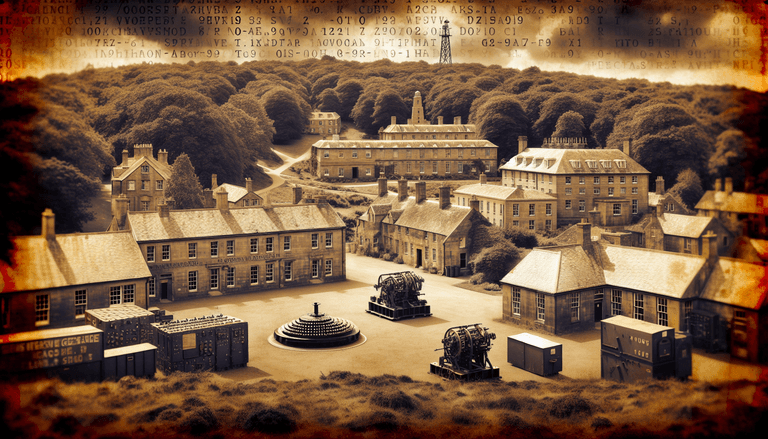Dear reader, imagine for a moment, if you will, the austere and enigmatic setting of Bletchley Park during the Second World War. An eclectic group of brilliant minds is gathered, steeped in secrecy, huddled over Enigma machines that are gurgling out their riddles like cryptic tea leaves. You can almost hear the clatter of typewriters accompanied by the hushed whispers of impending genius. Picture, if you can, enchantingly eccentric mathematician Alan Turing in his woolly jumper, thusly anticipating the scathing British climate while solving puzzles of global importance. But what if, as we indulge in this cerebral reverie, we threw a curveball into the equation, the wonderful chaos of Twitter.
The Park Goes Social
Now, Bletchley Park was a hub of top-secret operations, yet for the sake of our whimsical exploration, let's consider the unthinkable: What if this crucible of codebreaking had a Twitter account? Would @Codebreakers_UK have trended like hashtags do at a summer music festival? Would Turing have converted his hastily scribbled algorithms into cryptic Tweets?
First, we must address how cryptic Twitter would have gotten among the huts of Bletchley. Most likely, the boys and girls with brains at Bletchley would have concocted their own in-house Twitter lexicon, a curious blend of ciphers and hashtags. A simple “#goodmorning” might have transformed into “#E#G#M@7:45#A”. So delightfully confusing, any spy daring to intercept would find themselves likely needing a sit-down and a nice cuppa.
#MissionAcknowledged
Would tweets be in triple layers of security with encrypted missions only the intended audience could decipher? Launch operations from a simple "Good day Commander" tweet, anyone? Imagine Commander Alastair Denniston checking his Twitter feed for "#endofwar" and instead having to decode "#BletchleyPuzz#168™".
But before we become too bogged down in riddles, let us not forget the delight Twitter may have brought. The social media platform could quicken the thrill of a "Eureeka!" moment broadcasted to a select band of trusted followers. A simple, "#CrackedIt" tweet from @Alan_in_the_coding_schoolyard might have left followers gasping over their porridge, knowing their brains had indeed whispered the answer to yet another enigma sent by the German High Command.
Twitter: A Cipher's Best Friend?
Of course, it's plausible that Twitter could have transformed into a tool of morale-boosting banter amongst the codebreakers. Consider cryptographer Joan Clarke tweeting puns to keep spirits high, "Why don't we ever 'byte' our wires? #KeepTheLotInCode." Or of course, the poetically prone Gordon Welchman, known for his verve, perhaps breaking into spontaneous rhymes “More codes to cast away, let’s tweet them into dusty decay!”
With barely a moment's breath, the codebreakers would have insight into the whimsical dining menus of Hut 3 or the latest quagmire concerning the coffee supply. Bletchley Park’s Twitter feed would make a compelling case study in wartime logistics: "#rationingsaga Hut 6's got beans, anyone willing to trade for loo rolls? #SurvivalOfTheClampiest."
#ViralCryptography
The code-breakers may have discovered strength in numbers from their army of followers, after all. Perhaps a brief trend would spring up, “Code-Club: Break the barmy cipher and spike the syntax - all welcome but mind your Ps and Qs.” A viral thread would then sail through the cyberspace of 1940s Britain, aether bound for history buffs aged yet unborn.
With code-cracking knackiness at its heart, Bletchley Park wouldn’t have been limited to the peculiar privileges of 1940s. The cipher-centric chatter could by dusk see tweets bounce across the mighty Atlantic, as a retweet by @RosieRiveterUS gave patriotic pride a digital homeland, united across seas, encrypted and emboldened.
A Most Needful Discretion
But yet, dear reader, it is vital to remember that any dalliances with this bold new world by Bletchley Park must remain shrouded in discretion. While espionage and merriment might flirt through the dimly-lit corridors of Twitter, secrecy was the lingua franca of the day.
In the ultimate act of irony, perhaps reports would surface that Bletchley’s tweets were overheard by history and humanity alike, not heard by the ear, no, but preserved in the annals of the mind, cryptic and transformative in motive. Indeed, the moment Twitter had been invented, these enigmatic whispers were no doubt ahead of their time, revealed for future tenses whilst ever bound in past perfect.
Alas, while today's Twitter threads embed themselves into headlines, Bletchley's would be encrypted into yarns, woven from secrecy and intellect. Yet one can imagine they would have been absolute corkers, the kind elevated by the arts of names immortal: Turing, Clarke, Welchman, and those forgotten names forever famed at Bletchley.
Finally, amidst such imagined irreverence, I do suppose there would yet be one uncrackable code forever retained by Bletchley’s tweeters, etched across tomorrow’s wall of fame: "#DoGiveIt@GoodTwist." Such is the timeless providence of secrets tweaked on Twitter. Never leaked... or so we’d like to believe!







